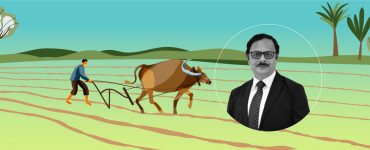Speaker Bio:
Dr. Praveen Rao Velchala has a Ph.D. in agronomy and specialises in tropical field and orchard crop micro-irrigation and fertigation solutions, as well as crop yield – water modeling. He has worked at the Agricultural University in various roles since 1983, including as a teacher, researcher, extension agronomist, and administrator. He authored 10 books, 9 crop growing guides for farmers, 12 micro-irrigation project documents, and managed 13–Research and 6–Consultancy micro-irrigation projects.
Q) How do you see the role of PJTSAU evolving in supporting agriculture innovations in Telangana?
Introduction:
Dr. Praveen: Professor Jayashankar Telangana State Agricultural University (PJTSAU) is the only Agriculture University in Telangana and is also the youngest Agri University amongst the 75+ Agricultural Universities in India. Closed innovation was the pattern adopted until the early 2000s, in which research and development (R&D) were conducted solely in our laboratories, using qualified professionals and significant resources. However, in the last decade, open innovation emerged as a new model, in which we take advantage of the creativity of students, researchers, rural youth or independent inventors through partnerships, thereby obtaining more innovation, faster and with less spending. Inventions generated within the university are offered to the market, bringing additional revenue.
Problems in AgTech Community:
Agritech Startups often struggle to reach out to bureaucracy and policymakers, specifically at the state level. At present, Agritech Startups are supported through its Incubation programs for supporting early-stage Startups and other Startups to pilot their innovations (either at POC or MVP) at the field level for pilots and validation through a ‘First of its Kind program’ called’ AgriTech Innovation pilot’. We hope to cater to AgriTech Startups and create a culture of entrepreneurship among the young agriculture graduates, rural youth and promote rural agribusinesses.
Engagement Model:
PJTSAU has recognised agri-innovation pathways as emerging routes for enhancing the efficiency of the production system, food and nutritional security, and economic security for the stakeholders in the agri-food value chain, including farmers. We established a dedicated Center of Agri Innovation and Agri-entrepreneurship in 2020 and then an SPV in the form of AgHub, Agri Innovation Hub to cater to innovations in Agriculture. The AgHub is a first of its kind incubator modelled in a “Hub and Spoke” format with its Tech Hub at Hyderabad in the PJTSAU main campus and its rural innovation centres in districts of Telangana, e.g., Vikarabad, Warangal & Jagtial. The AgHub caters to Agritech Startups through Incubation-Agritech Pilots and Innovation Bridges and builds entrepreneurship skills among Agri graduates/ postgraduates of the PJTSAU and other Agri universities. The rural innovation centres cater to the rural entrepreneurs in Telangana.
In this open innovation model, universities are demanded for closer ties with the productive sector and other stakeholders, forming the third mission for universities, besides (the first and traditional) and researching (the second mission). The recognition of the third mission has increased during the past few years. It involves all collaborations & partnerships between the university and non-academic partners, known as capitalisation of knowledge. The vision of an “entrepreneurial university” is to licence technologies, or business creation by researchers, which are the primary forms of transferring the results of academic research.
Role of PJTSAU
We wish to play an essential role in enhancing the skills and capacities of village-level entrepreneurs who can act as channel partners for agritech Startups to make their innovations accessible to farmers.
AgHub leverages the progressive ecosystem of the Telangana State with its sprawling network of incubators to partner with established Agribusiness Industries and Research institutions. It aims to implement the reformist initiatives led by the Government of Telangana and its Departments, including the IT department & Department of Emerging technologies etc. Another area we want to focus on is high-quality action research to document how innovations are impacting the farmer’s income, challenges in adoption of emerging technologies viz., AI, ML, sensors, blockchain, RS & GIS etc., financing solutions to smallholders and pan-India market linkages by smallholder farmers, innovation in credit financing and pan-India market linkages for agri-commodities.
Q) Can you share with us some of the key outcomes of the AI4AI project spearheaded by the World Economic Forum, where you have been a part of the core team?
Dr. Praveen: The agriculture sector has a long history of innovating and adopting new technologies to increase productivity, manage risk and improve environmental, social and economic sustainability. AI4AI Project has substantially broadened the breadth, scale and immediacy of what these emerging technologies such as cloud computing, IoT, AI, Big data analytics, Blockchain, Sensors, UAVs, RS & GIS etc., and related innovation, would be able to deliver to farmers, policymakers and administrators. Emerging technologies can help Telangana State’s agriculture policy goals by reducing the problems caused by data & information gaps, information asymmetries, and incentive misalignments. All of these can contribute to increased transaction costs and limit the feasible set of policy options.
Further, the conceptual framework built by World Economic Forum can identify where potential exists to make (increased) use of emerging technologies to underpin more inclusive policies, promoting sustainable & productive agriculture to improve agri-environmental policies throughout the cycle to estimate the cropped area under rice varieties gave us insights into data challenges, accuracy and reliability of these technologies for improving the farming situation. However, emerging technologies are not a panacea; they are a means to an end and can create new challenges. The potential for these challenges to occur should be considered both upfront, so that the policy design can take them into account and mitigate them during policy implementation so that the challenges can be addressed as they arise and digital tools can be refined.
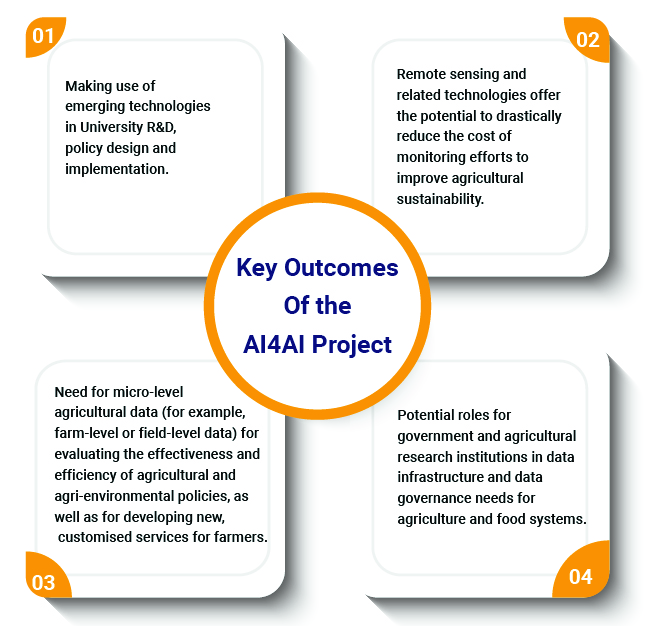
Key Outcomes of the AI4AI Project:
Key outcomes of the AI4AI instead of:
- Making use of emerging technologies in University R&D, policy design and implementation.
- Remote sensing and related technologies offer the potential to drastically reduce the cost of monitoring efforts to improve agricultural sustainability.
- Need for micro-level agricultural data (for example, farm-level or field-level data) for evaluating the effectiveness and efficiency of agricultural and agri-environmental policies, as well as for developing new, customised services for farmers.
- Potential roles for government and agricultural research institutions in data infrastructure and data governance needs for agriculture and food systems.
Fostering deployment of appropriate emerging technologies in identified crops and commodities through a largescale pilot to address agricultural challenges would be the next step by this consortia-led approach.
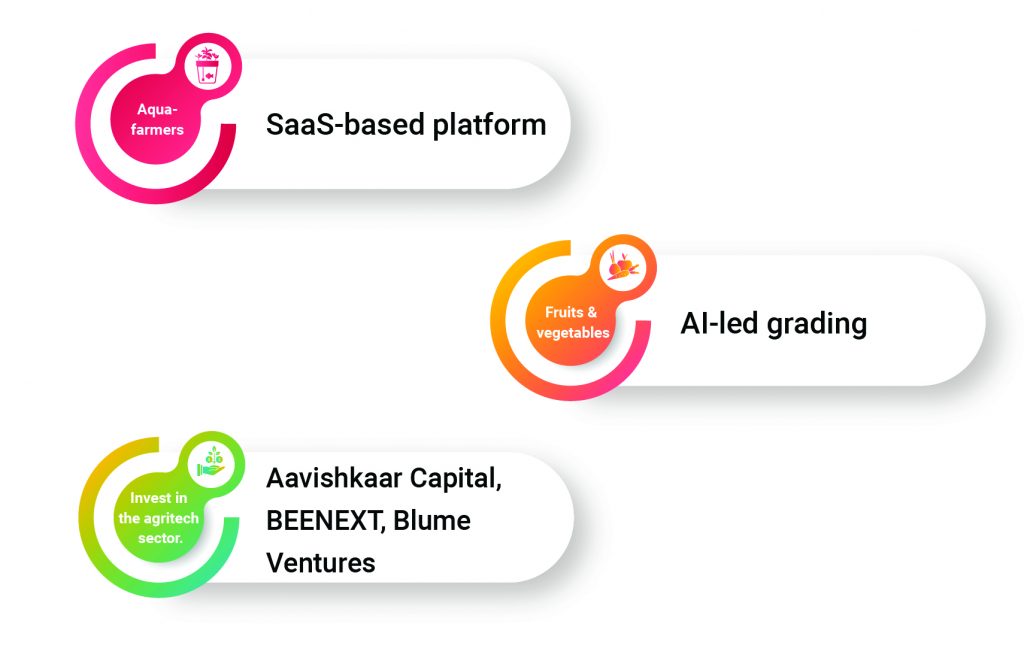
Q) There has been a boom in AgTech companies across India in the past 3-4 years. Do you see this growth creating an impact for the farmers, or would you say that it’s very much venture capital fueled hype?
Dr. Praveen: Yes, certainly there has been a boom in the AgriTech Startups across India despite a pandemic-hit year. According to NASSCOM & Ken Research Report, over 600 post-POC Agritech Startups are ‘emerging-growing-scaling’ in the Indian agritech ecosystem, most of them with a vintage of less than 5-years.
Agriculture, a sector heavily regulated by the government, largely traditional with little or no exposure to digital, and primarily unpredictable due to its heavy dependence on climatic conditions, was not on the VC radar in India. But, agritech was gaining focus globally. Omnivore saw this opportunity and was India’s first sector-specific VC funds launched in 2010. Since then, Omnivore has funded 24 Startups across various agritech sub-sectors. These include farmer platform and full-stack agri-market, protected agriculture, dairy digitisation platform, SaaS-based platform for aquafarmers, AI-led grading for fruits & vegetables, farm finance and processed food brands. Several others, CIIE.CO by IIM-A, Villgro, Aavishkaar Capital, BEENEXT, Blume Ventures, and others invest in the agritech sector. According to expert analysis, investors have pumped in close to $1.7 billion in upstream agritech deals between 2014 and 2019.
The momentum has started to pick up with an expected CAGR (revenue) of 32 per cent from FY20 to FY25. The government acknowledges the importance of the agriculture sector. It is also providing support to the agritech landscape through various reforms – amendments to the Essential Commodities Act, Reforms for the produce selling process and The Farmers Empowerment and Protection Agreement on Price Assurance & Farm Services Ordinance besides initiatives such as transporting & marketing assistance, Agri-udaan, multilingual mobile apps, custom hiring centres, computerisation of PACS, PMKSY, PMFBY etc.
Pull and Push Factors Driving The AgTech Sector:
We feel that on the country’s agritech market landscape, multiple pull factors are driving growth in this sector:
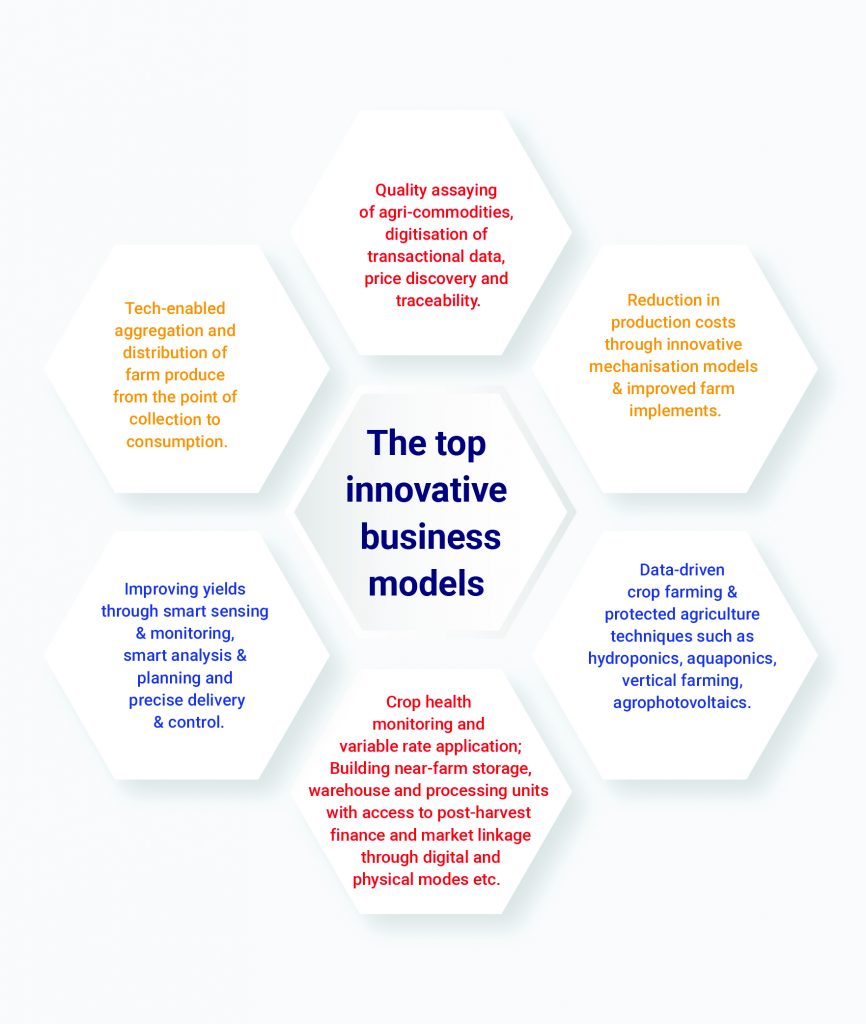
- Efficiency increase by lower cost price or better market price.
- Improved management control & decision making.
These factors help deal with volatility in weather conditions & climate change, water scarcity, soil degradation, price volatility, annual average post-harvest losses of around USD13 billion in the agri-food value chain, supply chain inefficiencies, food losses and wastage of over 40% before its reaches the end consumer due to supply chain intermediaries. Besides these, public drivers include food & nutritional security, food safety and sustainability. Whereas, push factors for rising agritech landscape are: general technological developments viz., AI its subsets such as ML, deep learning; IoT, data digitisation & advanced data analytics, GNSS, satellite imaging, robotics, UAVs, advanced RS & GIS, blockchain, biotechnology, nanotechnology etc., and increased digital connectivity & computational power, innovation possibilities (open farm management systems with specific apps, remote/computer-aided advice & decisions, online farmer shops etc.)
As a result, a variety of business models have already emerged to tackle multidimensional problems prevalent in the Indian agri-food values chain, including low yields & yield gaps, low input (water, fertiliser, pesticide & herbicide) use efficiency, sub-optimal supply chain & post-harvest management, output market linkages, low institutional credit, crop insurance, quality agri-inputs and market linkages.
The top innovative business models include:
- Improving yields through smart sensing & monitoring, smart analysis & planning and precise delivery & control.
- Tech-enabled aggregation and distribution of farm produce from the point of collection to consumption.
- Quality assaying of agri-commodities, digitisation of transactional data, price discovery and traceability;
- Reduction in production costs through innovative mechanisation models & improved farm implements.
- Data-driven crop farming & protected agriculture techniques such as hydroponics, aquaponics, vertical farming, agrophotovoltaics.
Crop health monitoring (nutrient stress, pest & disease damage) and variable rate application. Building near-farm storage, warehouse and processing units with access to post-harvest finance and market linkage through digital and physical modes etc.
There are estimated about 13.5 million farm households in India, with a majority of small & marginal landholders owning less than 2.0 ha of farmland. According to NSSO Survey, an average agricultural household earns about Rs. 77,112 per year to meet his personal, family, and occupational needs.
As a result, farmers are often left with a little surplus for productive investment for new-age solutions. But, as demonstrated by over 600+ mature agritech Startups, innovations combined with smart farming techniques in the agriculture sector can go a long way in enhancing the efficiency of the production system with reduced production costs. This will improve productivity and farm profitability and empower farmers to de-risk against volatility in market prices, aberrant weather conditions.
Q) Under your leadership, PJTSAU has become a unique success story in India’s industry-academia partnerships in the agriculture sector. We would love to know how you went about enabling it.
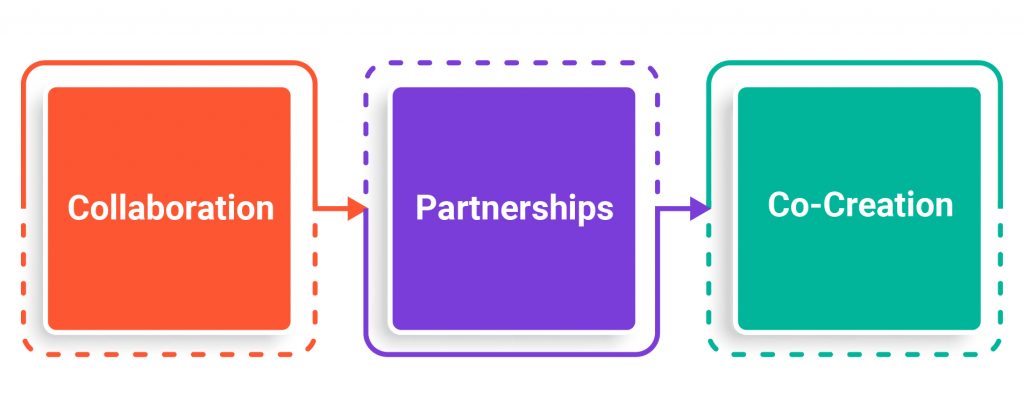
Dr. Praveen: PJTSAU envisages building a vibrant Agritech Incubator in the state Agricultural Universities. We believe that it would be only possible to create such a vibrant innovation ecosystem with the principles of Collaboration, Partnerships and Co-Creation. For that matter, PJTSAU already has 40+ National & International Partnerships with many Industry-Academia, State and Central level Institutions including multiple ICAR Institutions & State Universities and other Government / Academic / R&D Institutions (NRSC, TISS, IIT-H, IIT-Mumbai, ISB etc.), Agribusiness Industries (ITC, Coromandel, Patanjali, TAFE, Pioneer, Nuziveed Seeds, Kaveri Seeds, Tech Mahindra etc.), and highly ranked global institutions, such as University of Florida (Jackson Ville, Florida), University of California (Davis, USA), ICRISAT (Hyderabad, India), Western Sydney University (Australia), Cornell University (New York, USA), The Field Crops Research Institute (Vietnam), University of Hohenheim (Germany), International Rice Research Institute (IRRI) (Philippines), University of Perideniya (Sri Lanka), and others.
These collaborations of PJTSAU with national and global institutions ranging from research, Academia and agroindustry have led to innovative value pathways arrangements focusing on inter-organisational We are conducting collaborative R&D, research services including contract research & consulting, academic entrepreneurship, postgraduate activities in agro-firms, licencing university generated generated technologies to firms, formation of social networks at conferences, market & entrepreneurship oriented curriculum, reforms in admission framework to attract talent, the establishment of new institutions in Tier-II cities to increase student strength, enhancing human resource capacities, scientific publications in high impact journals, and others.
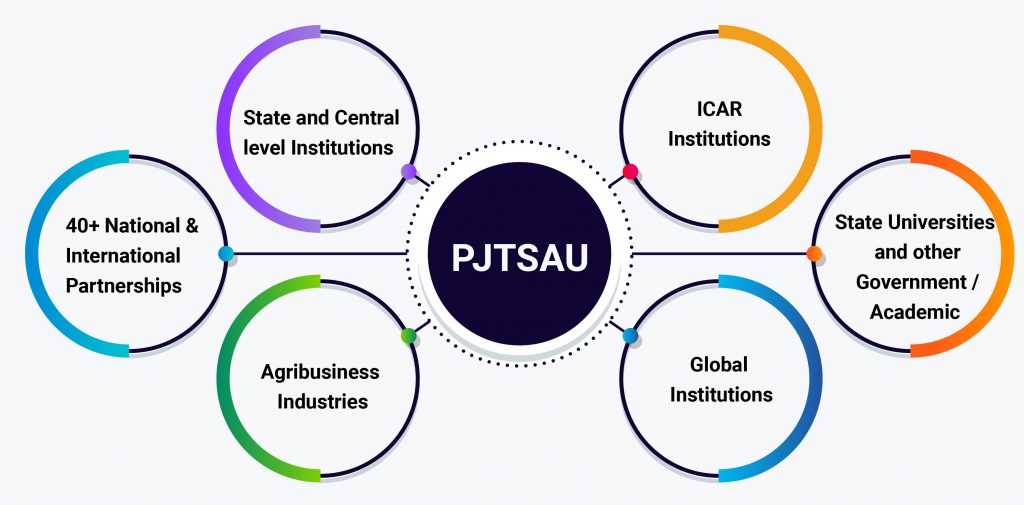
These active collaborations enabled over 1,000 million INR revenue generation in the past five years and contributed to enhanced University Rankings. It has dovetailed its trajectory to be at 6th position amongst 74 Agricultural Universities in the country and secured 30th Rank during 2019 in INDIA TODAY survey of the all Public Universities in the Country and secured 46th Rank in OUTLOOK India Public University Rankings 2019.
These collaborations have further helped PJTSAU scientists – students – Faculty – farmers, and other agri-stakeholders abreast of the latest happenings in the global agricultural ecosystem. A complimentary initiative was added to the ecosystem, establishing AgHub in 2020 to strengthen the entrepreneurship ecosystem and strategic future collaborations & partnerships. AgHub at PJTSAU has already collaborated with CII, ISB-Mohali, APMAS and We-Hub and as an immersion partner in CISCO Agri Grand Challenge 2021 for enhancing the activities of AgHub to promote the culture of innovation and entrepreneurship in Agriculture. AgHub at PJTSAU has already collaborated with CII, ISB-Mohali, APMAS and We-Hub and as an immersion partner in CISCO Agri Grand Challenge 2021 for enhancing the activities of AgHub to promote the culture of innovation and entrepreneurship in Agriculture.
Q) Are there any changes made in the curriculum of bachelors and masters students in the recent past to cater to the dynamically evolving talent needs of the commercial agriculture sector?
Dr. Praveen: The agritech sector needs top-quality talent for scaling the innovative agritech models. There is a need for nurturing talent at the college & university level by incorporating skilling and entrepreneurship in all agricultural programmes. The PJTSAU has taken up multiple reforms to enhance the curriculum and pedagogy of the Bachelors, Masters & Doctoral programs.
The PTSAU offers B.Sc., M.Sc., PhD programmes in agricultural sciences, B.Tech., programme in Agriculture Engineering & Food Technology and MBA in Agribusiness faculty, besides a 2-year diploma course in agriculture, organic farming, seed production & agriculture engineering exclusively directed towards rural youth. The technical curriculum of these courses is updated periodically, every 5-years, to cater to employability, entrepreneurship & market needs.
Similarly, to cater to the needs of basic & strategic applied research, skilling and entrepreneurship programmes, several initiatives were launched. These are HR need assessment & strategic planning for 2030, e-governance, P&M cell, formation of research communities & discussion boards, the establishment of state-of-the-art physical infrastructure including dedicated academic (virtual & model classrooms) & research blocks, access to digital online national (3400+) & international (530+) peer-reviewed journals, policy for participation in national & international conferences, Adjunct Professorship, NABL accredited labs, Central Instrumentation Cell, and Pilot Processing units for value addition of agri-commodities.
To inculcate the culture of innovation and entrepreneurship among young graduates, they are offered skillset enhancing experiences like technology-based Agri-Entrepreneurship Learning programs (AELP’s), Rural work experience, Agro-industry internships, report writing etc.
Further Design Thinking Programs for Agriculture graduates has already been launched to promote the culture of innovation-led entrepreneurship among the agriculture graduates; the same program would be replicated for the PG and PhD students this year. Further, we are engaging the MBA Agribusiness graduates of PJTSAU in action research and live projects of the Agritech Startups to expose them to the expanding agritech landscape in the country. The premier institute, ISB-Hyderabad, has been roped in to revamp the course curriculum of the MBA-Agribusiness programme. Also, given the huge application of data sciences, AI, Sensing & blockchain technology, RS&GIS in new-age agritech models, a few elective and certificate courses are being planned to benefit students and rural youth.
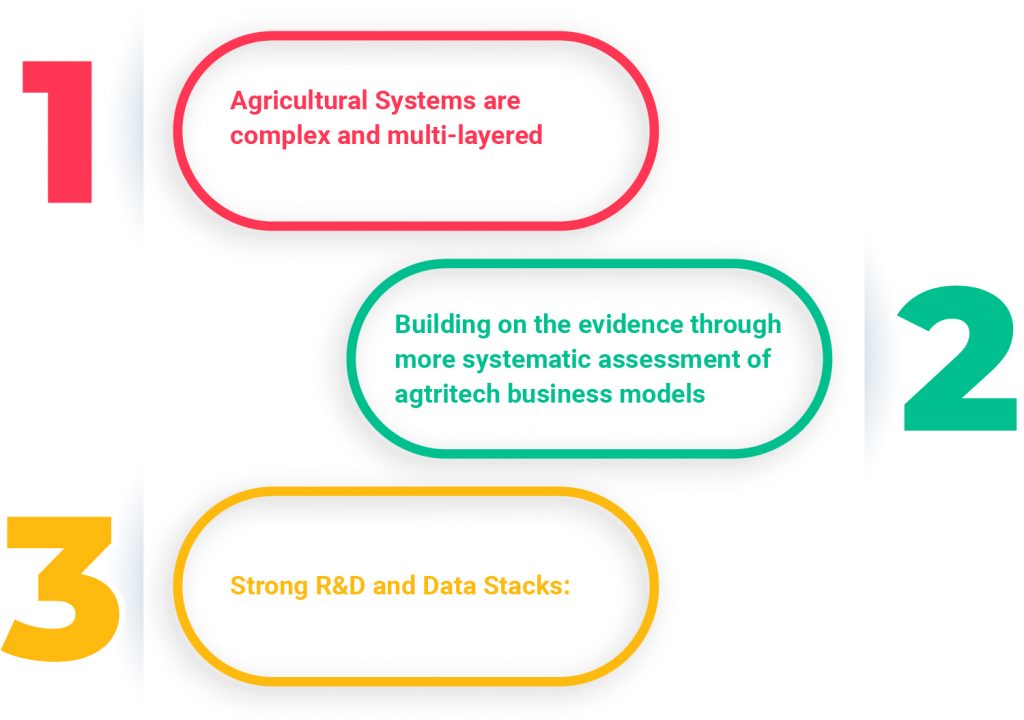
Internship with agritech Startups could be another way to familiarise young graduates with startup culture.
Q) From your long experience as an agriculture scientist, if I have to ask you three key learnings that you would want to share with young AgTech entrepreneurs, what will these be?
Dr. Praveen: Agricultural systems are complex and multi-layered
Each system is set by itself and needs a customised hyperlocal solution approach. The recent trend of tech-based entrepreneurs is welcome. Still, my advice is that since agriculture needs a different set of attitude, knowledge and skills, spare time to understand ground realities, solutions should be worked through a bottom-up approach with stakeholder consultation as the primary tool.
Building on the evidence through more systematic assessment of agtritech business models
One of the most significant knowledge gaps in the agritech sector is the understanding of what works and does not work in building and scaling agritech business models that involve smallholder farmers – particularly models that are inclusive, sustainable, and commercially viable. To a large extent, this is natural; the sector is still in its infancy, with providers experimenting and learning from business model innovations. But as the industry prepares for the next phase of growth, we must wield a deeper and more systematic understanding of business models.
Strong R&D and Data Stacks:
Agritech landscape in India is still in the infancy stage with just 1-2% penetration of the estimated market potential of USD 24 billion. However, for the Indian agritech market to reach its potential, a strong R&D base and international collaborations & partnerships are essential for scientific innovation and building foundational blocks that help the country establish a flourishing startup ecosystem. Further, success in the agritech landscape depends on the Startups’ ability to innovate the agri-food value chain without disrupting traditional channels, ability to co-exist and establish partnerships with FPOs, MSMEs, and the Agri- input industry, Agri-machinery& Irrigation industry, Food Processing units, research organisations etc.
Clarity is also needed by researchers of NARES and entrepreneurs on agri-data stacks, data ownership, privacy & security issues, intelligent processing and analytics, and sustainable integration of data sources.
The openness of data platforms will help accelerate solution development and innovation in general and empower farmers in their position in supply chains. The convergence of ideas, partnerships and forward-thinking among policymakers can build the new ecosystem. This needs time and patience.
This article was originally published in The SatSure Newsletter (TSNL)



